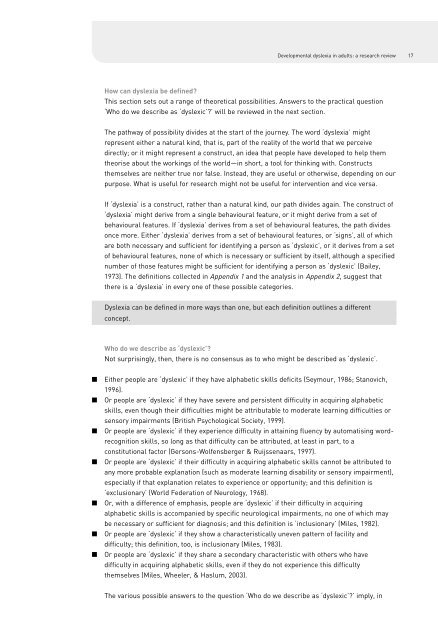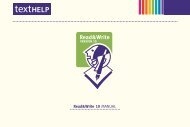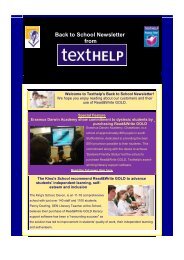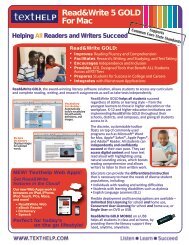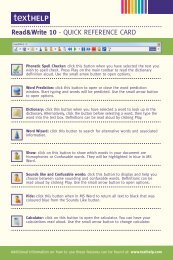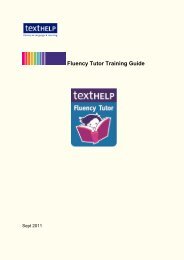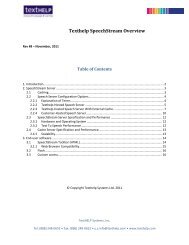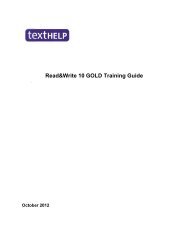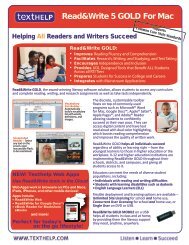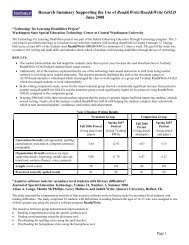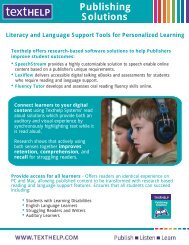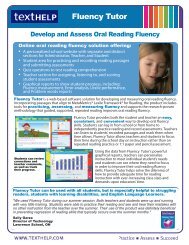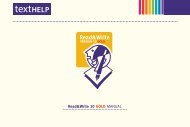01 NRDC Dyslexia 1-88 update - Texthelp
01 NRDC Dyslexia 1-88 update - Texthelp
01 NRDC Dyslexia 1-88 update - Texthelp
You also want an ePaper? Increase the reach of your titles
YUMPU automatically turns print PDFs into web optimized ePapers that Google loves.
Developmental dyslexia in adults: a research review 17<br />
How can dyslexia be defined?<br />
This section sets out a range of theoretical possibilities. Answers to the practical question<br />
‘Who do we describe as ‘dyslexic’?’ will be reviewed in the next section.<br />
The pathway of possibility divides at the start of the journey. The word ‘dyslexia’ might<br />
represent either a natural kind, that is, part of the reality of the world that we perceive<br />
directly; or it might represent a construct, an idea that people have developed to help them<br />
theorise about the workings of the world—in short, a tool for thinking with. Constructs<br />
themselves are neither true nor false. Instead, they are useful or otherwise, depending on our<br />
purpose. What is useful for research might not be useful for intervention and vice versa.<br />
If ‘dyslexia’ is a construct, rather than a natural kind, our path divides again. The construct of<br />
‘dyslexia’ might derive from a single behavioural feature, or it might derive from a set of<br />
behavioural features. If ‘dyslexia’ derives from a set of behavioural features, the path divides<br />
once more. Either ‘dyslexia’ derives from a set of behavioural features, or ‘signs’, all of which<br />
are both necessary and sufficient for identifying a person as ‘dyslexic’, or it derives from a set<br />
of behavioural features, none of which is necessary or sufficient by itself, although a specified<br />
number of those features might be sufficient for identifying a person as ‘dyslexic’ (Bailey,<br />
1973). The definitions collected in Appendix 1 and the analysis in Appendix 2, suggest that<br />
there is a ‘dyslexia’ in every one of these possible categories.<br />
<strong>Dyslexia</strong> can be defined in more ways than one, but each definition outlines a different<br />
concept.<br />
Who do we describe as ‘dyslexic’?<br />
Not surprisingly, then, there is no consensus as to who might be described as ‘dyslexic’.<br />
■<br />
■<br />
■<br />
■<br />
■<br />
■<br />
■<br />
Either people are ‘dyslexic’ if they have alphabetic skills deficits (Seymour, 1986; Stanovich,<br />
1996).<br />
Or people are ‘dyslexic’ if they have severe and persistent difficulty in acquiring alphabetic<br />
skills, even though their difficulties might be attributable to moderate learning difficulties or<br />
sensory impairments (British Psychological Society, 1999).<br />
Or people are ‘dyslexic’ if they experience difficulty in attaining fluency by automatising wordrecognition<br />
skills, so long as that difficulty can be attributed, at least in part, to a<br />
constitutional factor (Gersons-Wolfensberger & Ruijssenaars, 1997).<br />
Or people are ‘dyslexic’ if their difficulty in acquiring alphabetic skills cannot be attributed to<br />
any more probable explanation (such as moderate learning disability or sensory impairment),<br />
especially if that explanation relates to experience or opportunity; and this definition is<br />
‘exclusionary’ (World Federation of Neurology, 1968).<br />
Or, with a difference of emphasis, people are ‘dyslexic’ if their difficulty in acquiring<br />
alphabetic skills is accompanied by specific neurological impairments, no one of which may<br />
be necessary or sufficient for diagnosis; and this definition is ‘inclusionary’ (Miles, 1982).<br />
Or people are ‘dyslexic’ if they show a characteristically uneven pattern of facility and<br />
difficulty; this definition, too, is inclusionary (Miles, 1983).<br />
Or people are ‘dyslexic’ if they share a secondary characteristic with others who have<br />
difficulty in acquiring alphabetic skills, even if they do not experience this difficulty<br />
themselves (Miles, Wheeler, & Haslum, 2003).<br />
The various possible answers to the question ‘Who do we describe as ‘dyslexic’?’ imply, in


